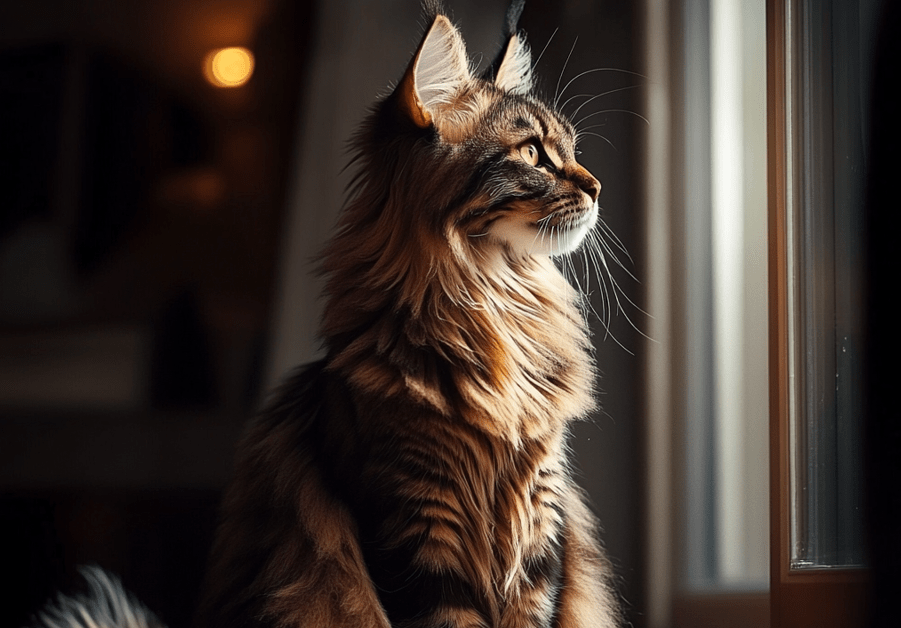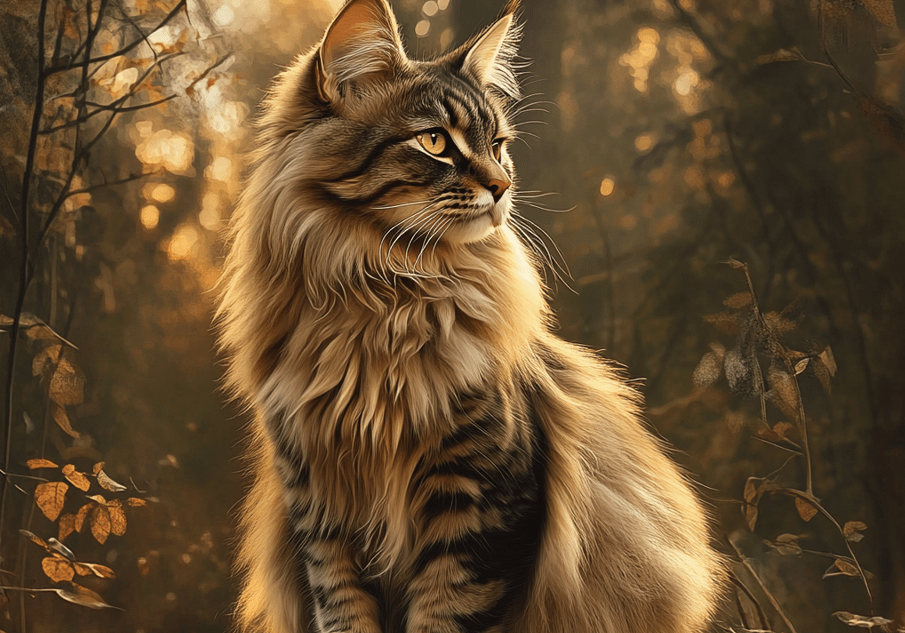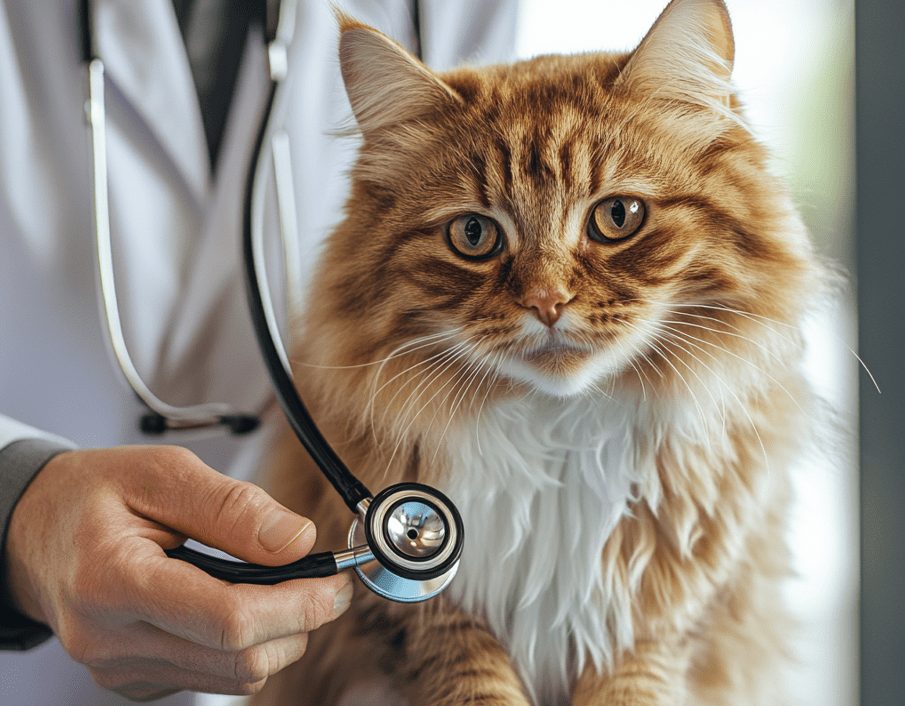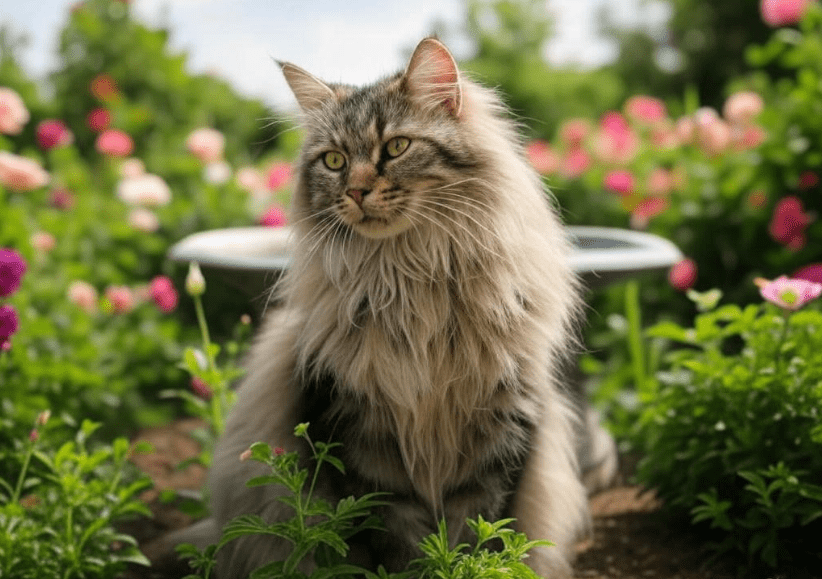
Maine Coon cats, often referred to as “gentle giants,” are one of the largest domesticated cat breeds, known for their friendly personalities, tufted ears, and luxurious coats. While their size is part of their charm, maintaining a healthy weight is crucial for their long-term health and well-being. Obesity in Maine Coons can lead to serious health issues, including diabetes, joint problems, and heart disease. This comprehensive guide explores Maine Coon weight management, offering practical tips to prevent obesity and ensure your feline friend thrives.
Understanding Maine Coon Weight: What’s Normal?
Maine Coon cats are naturally large, with males typically weighing 13–18 pounds and females ranging from 8–12 pounds. Some males can even reach 20 pounds or more without being overweight, depending on their frame and muscle mass. However, distinguishing between a healthy, muscular Maine Coon and an obese one requires careful observation.
Healthy Weight Indicators
Visible Waistline: When viewed from above, a Maine Coon should have a slight hourglass shape, with a defined waist behind the ribs.
Tuck at the Abdomen: From the side, the belly should slope upward toward the hind legs, not hang down.
Ribs Felt with Slight Pressure: You should be able to feel the ribs beneath a thin layer of fat when you gently press.
Signs of Obesity
1.No visible waistline or abdominal tuck.
2.Difficulty feeling ribs due to thick fat layers.
3.Lethargy, reduced activity, or reluctance to jump.
4.Breathing difficulties or excessive panting.
If you’re unsure about your Maine Coon’s weight, consult a veterinarian for a body condition score (BCS) assessment. This professional evaluation uses a 9-point scale to determine whether your cat is underweight, ideal, or overweight.
Why Maine Coon Weight Management Matters
Maine Coons are prone to certain health conditions that can be exacerbated by excess weight. Proper weight management can prevent or mitigate these risks, ensuring a longer, healthier life for your cat.
Health Risks of Obesity in Maine Coons
Diabetes Mellitus: Excess fat can lead to insulin resistance, increasing the risk of diabetes, which requires lifelong management.
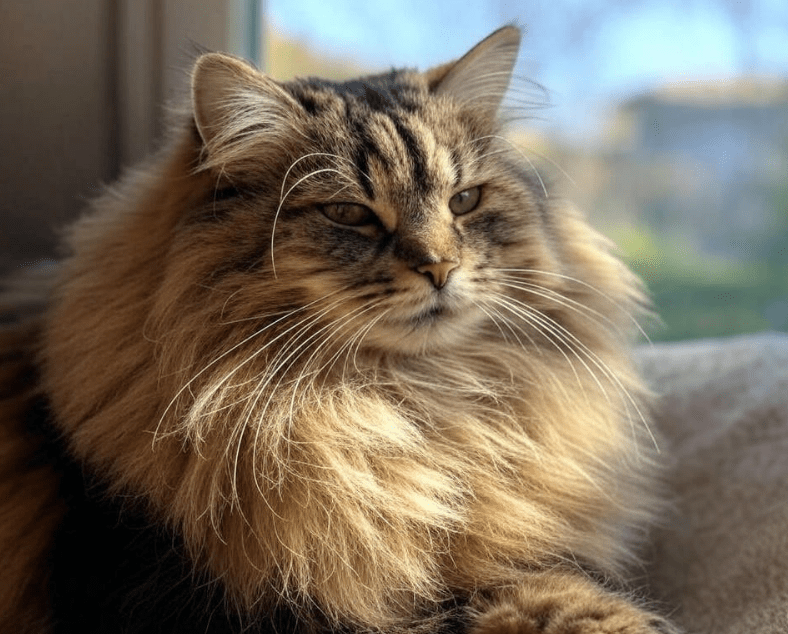
Joint Issues: Maine Coons are susceptible to hip dysplasia and arthritis. Extra weight puts additional strain on joints, worsening these conditions.
Heart Disease: Obesity can contribute to hypertrophic cardiomyopathy (HCM), a common heart condition in Maine Coons.
Reduced Lifespan: Studies show that obese cats have shorter lifespans compared to those maintained at a healthy weight.
By prioritizing Maine Coon weight management, you can reduce these risks and improve your cat’s quality of life.
Factors Contributing to Obesity in Maine Coons
Several factors can lead to weight gain in Maine Coons, and understanding them is the first step toward effective prevention.
1. Overfeeding
Maine Coons have hearty appetites, and their large size might tempt owners to overfeed. Free-feeding (leaving food out all day) can also lead to excessive calorie intake.
2. Lack of Exercise
While Maine Coons are playful and active, indoor cats may not get enough physical activity, especially as they age. Sedentary lifestyles contribute to weight gain.
3. High-Calorie Diets
Feeding low-quality, carbohydrate-heavy foods or excessive treats can cause rapid weight gain. Maine Coons need a balanced, protein-rich diet to support their large frames.
4. Spaying/Neutering
Spaying or neutering reduces a cat’s metabolism, making weight gain more likely if diet and exercise aren’t adjusted.
5. Medical Conditions
Certain conditions, such as hypothyroidism or Cushing’s disease, can cause weight gain. Always consult a vet if your Maine Coon gains weight suddenly or without explanation.
Tips for Maine Coon Weight Management
Preventing obesity in Maine Coons requires a multifaceted approach, combining proper nutrition, regular exercise, and consistent monitoring. Below are actionable tips to keep your Maine Coon at a healthy weight.
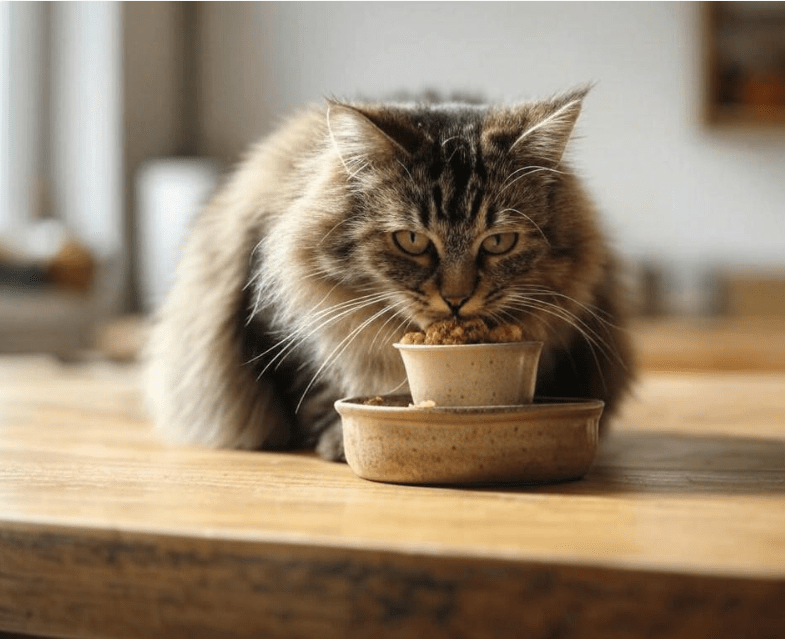
1. Feed a High-Quality, Protein-Rich Diet
Maine Coons thrive on diets high in animal-based proteins, which support muscle maintenance and satiety. Look for cat food labeled as “complete and balanced” by the Association of American Feed Control Officials (AAFCO).
Choose Wet Food: Wet food is lower in carbohydrates and higher.Concurrent in moisture, which helps with weight control and urinary health.
Avoid Fillers: Steer clear of foods with excessive grains, corn, or soy, which can contribute to weight gain.
Portion Control: Follow feeding guidelines on the food packaging, adjusting based on your cat’s weight, age, and activity level. Use a measuring cup to ensure accuracy.
Consult your veterinarian to determine the ideal daily calorie intake for your Maine Coon. For example, a 15-pound Maine Coon may need 300–400 calories per day, depending on activity level.
2. Implement Scheduled Feeding
Instead of free-feeding, offer meals two to three times daily. Scheduled feeding allows you to monitor food intake and prevent overeating. If your Maine Coon begs for food, try puzzle feeders or slow-feed bowls to make mealtime more engaging and satisfying.
3. Limit Treats and Table Scraps
Treats should make up no more than 10% of your Maine Coon’s daily calorie intake. Opt for low-calorie, high-protein treats, such as freeze-dried meat. Avoid giving human foods, especially those high in fat, sugar, or salt, as they can contribute to weight gain and health issues.
4. Encourage Regular Exercise
Maine Coons are naturally active and enjoy interactive play. Incorporate daily exercise to burn calories and keep your cat mentally stimulated.
Interactive Toys: Use feather wands, laser pointers, or motorized toys to engage your Maine Coon’s hunting instincts.
Climbing Structures: Install cat trees or shelves to encourage climbing and jumping.
Puzzle Toys: Food-dispensing toys promote physical activity while rewarding your cat with small amounts of kibble.
Play Sessions: Aim for 15–30 minutes of active play daily, split into multiple sessions.
Rotate toys regularly to keep your Maine Coon interested and prevent boredom.
5. Monitor Weight Regularly
Weigh your Maine Coon every 1–2 months using a pet scale or a home scale (weigh yourself, then weigh yourself holding the cat and subtract the difference). Track weight changes in a journal to identify trends early. If your cat is gaining weight, consult your vet to adjust diet or investigate underlying issues.
6. Provide Fresh Water
Hydration supports overall health and can help with weight management. Ensure your Maine Coon has access to clean, fresh water at all times. Consider a pet water fountain, as Maine Coons are often attracted to running water.
7. Address Underlying Medical Issues
If your Maine Coon is gaining weight despite a controlled diet and exercise, schedule a veterinary exam. Blood tests can rule out conditions like hypothyroidism or diabetes. Early detection and treatment are critical for managing these issues.
8. Work with Your Veterinarian
A veterinarian can create a tailored weight loss plan if your Maine Coon is already overweight. This may include a prescription weight-loss diet, specific calorie targets, and a safe exercise regimen. Avoid crash diets, as rapid weight loss can lead to hepatic lipidosis (fatty liver disease) in cats.
Creating a Weight Loss Plan for Overweight Maine Coons
If your Maine Coon is obese, gradual weight loss is essential. Aim for a loss of 1–2% of body weight per month to ensure safety. For example, a 20-pound Maine Coon should lose about 0.2–0.4 pounds monthly.
Steps for Safe Weight Loss
Veterinary Assessment: Get a full health check to rule out medical causes and establish a baseline weight.
Calorie Reduction: Reduce daily calorie intake by 10–20% under veterinary guidance. Prescription weight-loss foods can help.
Increase Activity: Gradually increase playtime to boost calorie expenditure.
Monitor Progress: Weigh your cat every 2–4 weeks and adjust the plan as needed.
Celebrate Small Wins: Even small reductions in weight can improve your cat’s health and mobility.
Patience is key—safe weight loss takes time, but the benefits are worth it.
Maintaining a Healthy Weight Long-Term
Once your Maine Coon reaches an ideal weight, maintaining it requires ongoing effort. Continue with portion-controlled feeding, regular exercise, and periodic weight checks. Adjust calorie intake as your cat ages, as metabolism slows over time. Senior Maine Coons (over 7 years) may need fewer calories but still require high-quality protein to preserve muscle mass.
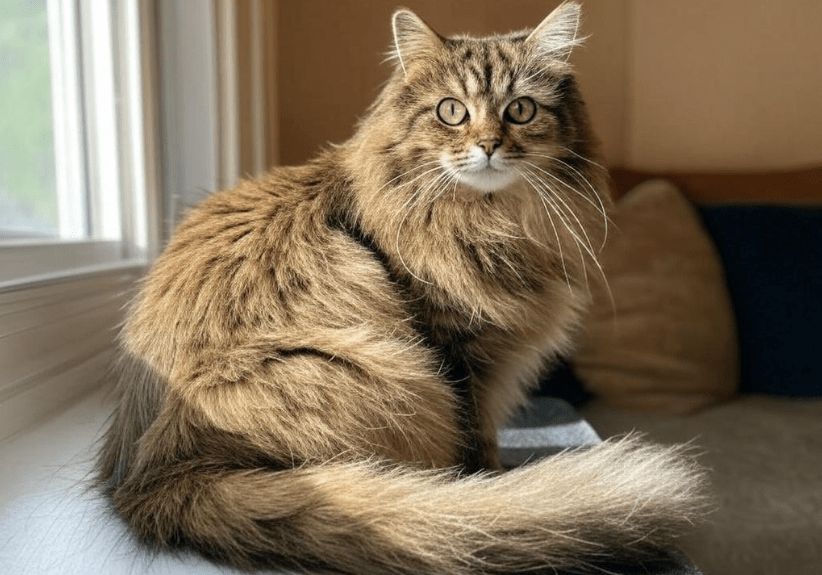
Common Myths About Maine Coon Weight
Myth 1: Maine Coons Are Supposed to Be Fat
While Maine Coons are large, excess fat is not healthy. A muscular, lean Maine Coon is the goal, not a heavy, overweight one.
Myth 2: Indoor Cats Don’t Need Exercise
Indoor Maine Coons need regular activity to stay healthy. Play and environmental enrichment are essential for their physical and mental well-being.
Myth 3: All Cat Foods Are the Same
Not all cat foods are created equal. Maine Coons require diets tailored to their size, activity level, and nutritional needs.
Additional Tips for Maine Coon Owners
Spay/Neuter Adjustments: After spaying or neutering, reduce calorie intake by about 25% to account for metabolic changes.
Multi-Cat Households: Feed cats separately to prevent food stealing, which can lead to weight gain in one cat and underfeeding in another.
Behavioral Enrichment: Stress or boredom can lead to overeating. Provide scratching posts, window perches, and interactive toys to keep your Maine Coon engaged.
Conclusion
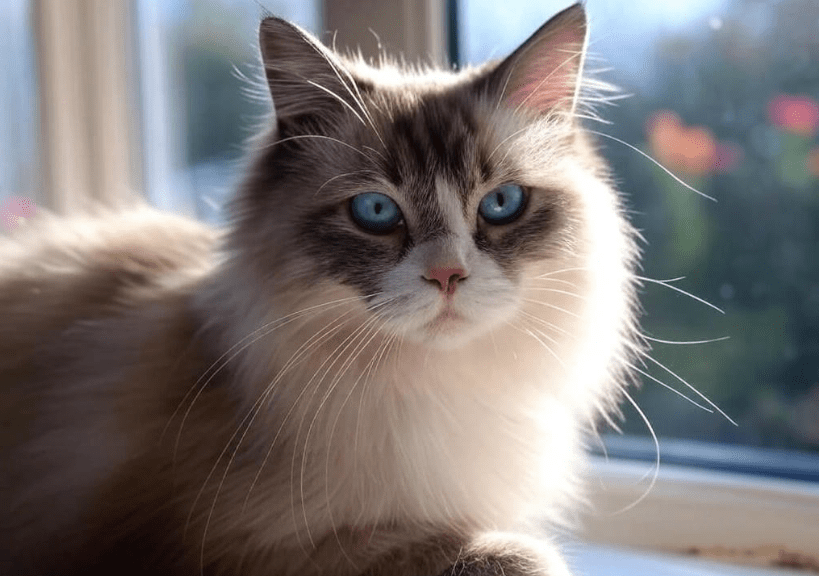
Maine Coon weight management is a critical aspect of responsible pet ownership. By understanding your cat’s unique needs, feeding a high-quality diet, encouraging regular exercise, and monitoring weight, you can prevent obesity and its associated health risks. Work closely with your veterinarian to create a tailored plan, especially if your Maine Coon is already overweight. With dedication and care, your gentle giant can enjoy a long, active, and healthy life.
For additional resources or personalized advice, consult your veterinarian or a feline nutritionist. Your Maine Coon deserves the best—start their weight management journey today!

